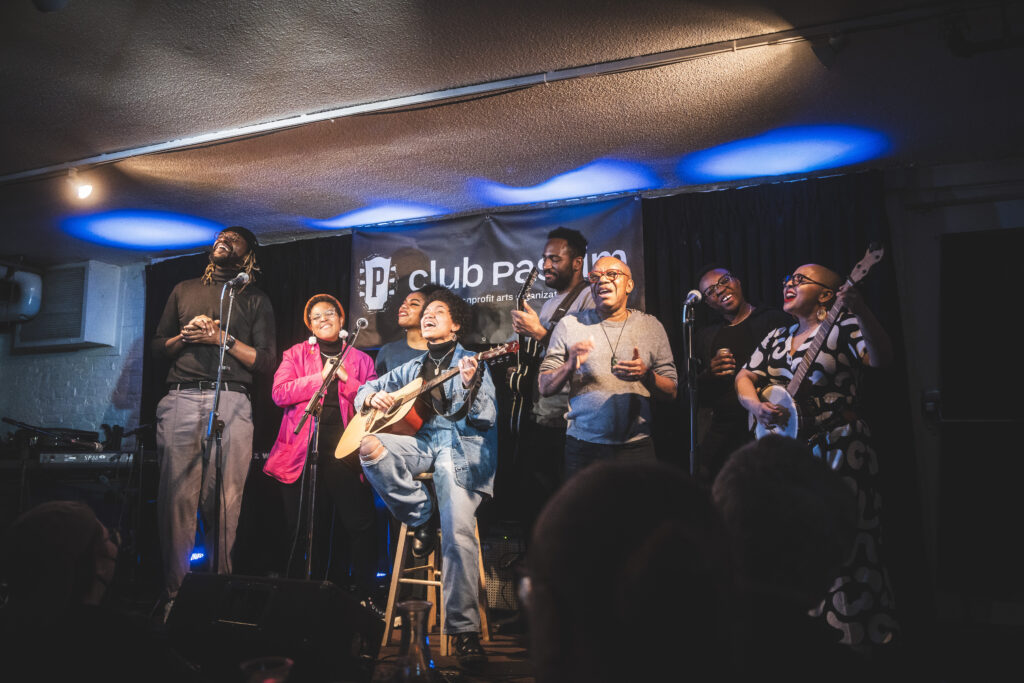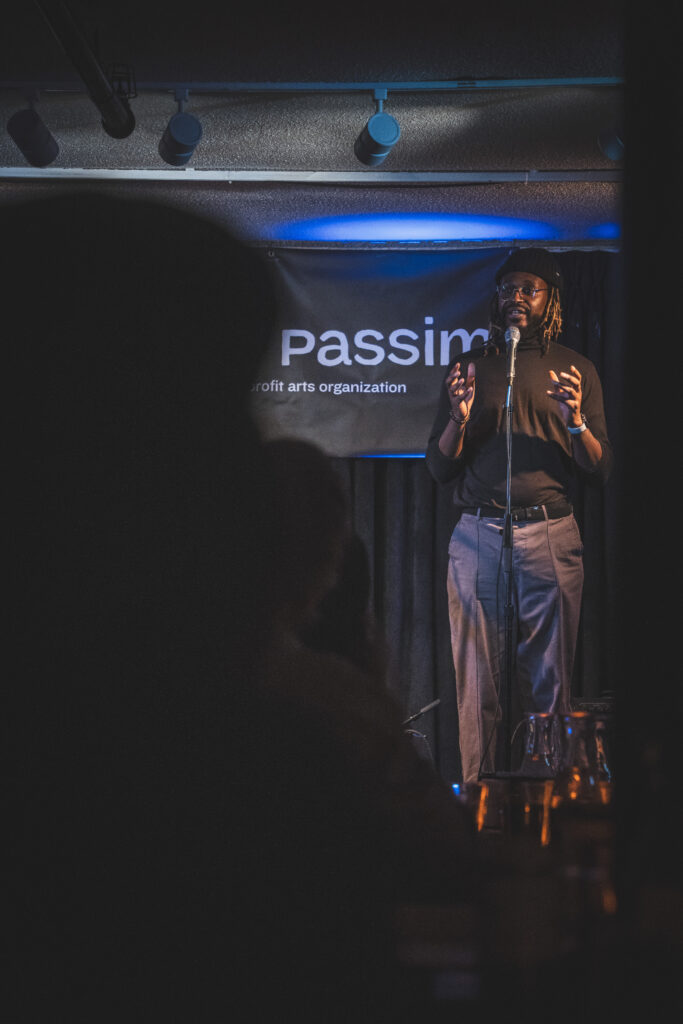
Photo by @allthingsharmony
We Black Folk is a debut folk festival curated by the one and only Cliff Notez and HipStory in partnership with Club Passim’s Folk Collective that celebrates folk music by Black artists. “I’ve been digging into my connection with not only the guitar and folk music, but also people again.” Cliff recounted his story of borrowing Will Dailey’s banjo and how he “felt the need to get close to it,” which included learning about the history of the banjo — which came from West Africa. So why is it that folk has always been more of a white genre? Cliff Notez highlighted that folk music is for Black people too. “This folk music might have been for me and is always for me.”
We Black Folk Fest started with a gorgeous rendition of “I’m Gonna Let It Shine” by all the artists of the night, and then it got right into the rest of the performances. Kicking us off for the first night of We Black Folk was Aisha Burns, who Cliff said would “blow our minds,” and that she did. As a fellow short girl, I loved that Aisha announced that she’s a bit shorter than everyone else, but that fact didn’t diminish her talent one bit. She shared a song inspired by the west Texas desert; what if your most depressed day was a mirage and you could find a way out of it. Her song “Must Be A Way” showcased her captivating voice, along with some very pretty folky vocal runs.
Next up was Stephanie McKay, who was accompanied by Joy Porter on electric guitar. Stephanie sang her song “Jackson Avenue” that had me bopping along from my apartment. Her clear and jazzy vocals definitely shone through. She even made everyone put their hands in the air and sing along while also shouting out the South Bronx.
Pink Navel was the next performer, who not only writes songs but also raps. For the festival, they leaned towards more of a folk genre. They sang their song “crumbling toons” that they wrote after living in Maine for 4 years. I’ve never been to Maine, but the picture Pink Navel paints in their lyrics about the “little view of the clouds” helped me imagine what the state must be like.
Cliff Notez, our host, also performed — starting his set by tuning his guitar on stage, which he joked was such a “folk artist” thing to do. Before he played his song “Black Incredible,” he educated the audience about the origin of country music (thank you A.P. Carter and Lesley Riddle). He also addressed how “hillbilly music” was formerly associated with white people and that “race music” included jazz and RnB.
Almira Ara was next, and I will be the first to say that I’m obsessed with their music! “I didn’t think I was a folk artist — Because of initiatives like the Folk Collective, I’ve stepped into my power. I’m going to redefine folk music and own that shit; honestly, most music is folk music because it’s about something,” stated Almira. Inspired by Cliff’s song, they decided to share their song “Black Girl,” which is for the inner child of every Black woman. Almira’s voice was so pure and I got goosebumps from their runs and from the harmonies that Stephanie McKay added to the song. Almira’s storytelling also stood out to me: “Little Black girl in this cold ass world.”
Melo Green, who also sang a bit during Almira’s set, was the next folk artist to come to the stage. He told us that he’s working on a new album and played a song he wrote a few weeks ago titled “Play Me Something New.” It was a very groovy song and he made us clap in 2-4 with him while he sang gorgeous runs in his falsetto. It’s a good thing I was watching the livestream because I’m very sure I was not in rhythm…whoops. He had a line “When we’re losing track of time” that stuck with me, and I can’t wait for this album to be out!
Last up for the night was Haasan Barclay. He introduced himself by saying he usually wears a shirt with his face on it, but he didn’t that night unfortunately. He had super catchy guitar riffs and some of his songs had a rock-feel to them. My favorite song of his was his song about yearning for someone titled “Curfews.”
My main takeaway from the first night of We Black Folk Fest was that folk encompasses so many elements, like storytelling, acoustic guitars, tuning said guitars on stage, and that because of people like Cliff Notez, we can appreciate and celebrate Black folk music.
We Black Folk Fest > Super Bowl Sunday

Photo by @allthingsharmony
Night two of We Black Folk Fest also started with a rendition of “I’m Gonna Let It Shine” by the night’s artists, with their own twist in the lyrics, “Even at Passim, I’m gonna let it shine.”
For tonight’s show, Cliff Notez had his own mic and made a joke about how it was because everyone was taller than him… (Cliff is 6’4 in case you didn’t know) “I was told my head gets cut off in the livestream, so I wore this turtleneck to give me some character!”
He shouted out The Folk Collective for his presence at Passim and acknowledged that there had always been something missing from Passim — the We Black Folk Festival is just the beginning of bridging that gap, thanks to Shea Rose. Though Cliff comes from a hip-hop background, he now feels comfortable in a folk space, which is a testament to how important We Black Folk Fest is on so many levels.
Gabby Simpkins, a singer-songwriter, multi-instrumentalist, and composer, kicked us off with her soothing voice and calm presence. “I’m a classical musician and the conductor usually does all the talking, so I’m going to get right into my songs.” She sang one of her recent favorites about a “touching situation she went through” that was a “hodge-podge of old lyrics and chord progressions” she approached with a fresh pair of eyes. The song conveyed vivid imagery of castles, wind, rain, and how they related to her experience with love, accompanied by these pretty finger-picking ripple melodies on guitar. My favorite line from the song was “How am I to play pretend like somehow I could comprehend what transpired in a flash of fire.”
Up next was “the legend,” as Cliff Notez introduced him, Kemp Harris. Kemp has some of the most powerful lyrics I’ve heard, and I’m so happy he’s using his art in that way. He started off with a song from his upcoming album America Chronicle, No. 1, and the song is dedicated to books that are banned, to history that has changed, and for the people who haven’t heard of the Tulsa Massacre. An example of said lyrics: “America’s been had again so white folks don’t get mad again, but let’s not worry. We’ll just pretend that everything’s okay.” The next song that Kemp performed, “Standing Your Ground,” had some special guests from The Folk Collective — Stephanie McKay, Cliff Notez, Almira Ara, and Naomi Westwater. They added harmonies and hums to the moving lyrics, “Another mother’s child lying dead on the ground. Keep searching for a justice – there was none to be found.” I’m so excited for Kemp Harris’ new album!
Cliff Notez came back to the stage to educate us about the history of stomping in Black folk music and sing us one of his original songs. He did berate us for stomping our feet weakly — “Have you never had cockroaches before?” he asked, judgingly. He drew parallels between foot stomping and drums — both created rhythms in different ways, specifically through syncopation (aka the rhythms between the rhythms). However, since the beats were a form of communication, drums were banned, which is why you don’t see a lot of drums in Black folk music. To demonstrate an example of stomping in one of his own songs, Cliff sang “Get Free I” with the audience, adding in claps and stomps to show what the absence of drums means to Black folk.
Grace Givertz graced us with her presence and her banjo, which is named Libba after Elizabeth Cotten. “I never thought I’d see this day — it’s because traditionally people who look like us don’t feel comfortable walking into spaces like this. I am so thankful and honored to be a part of We Black Folk Fest,” she reflected. Grace sang the title track of her album, “Year of the Horse,” which touches on her experience dealing with a chronic illness. Grace’s vocal projection truly amazes me during this song. Her vocals continued to shine through in her next song “Papa,” which she wrote for her grandpa and the other Black folk whose lives were stolen from them.
Chris Walton came up to the stage next and did the usual folk artist act (as we now know from Night 1) of tuning his guitar on stage before he sang his song “Soon.” “It’s really nice to be seen in the company of my peers on a bill together,” he said. Chris’ songs proved the range of what folk music is about — he had a bit of a jazzy, RnB, and folk feel. “I’ve been getting older as one does and that’s caused me to do a lot of self-reflections. It makes me think about things I don’t know in the world — It’s been great for my artistry. We use this as our therapy.” He sang a song called “Boys Don’t Cry” about growing up with toxic masculinity and feeling like he couldn’t express his emotions. He dedicated the song to his dad who passed away years ago, and I felt Chris’ vulnerability in the lyrics and melodies of the song.
The next artist was Anjimile, who Cliff said was “going to blow our minds” — and he was right. “If you haven’t listened to Anjimile’s new album, you live under a rock. They left Boston because they got too famous,” he told us. Anjimile said they were glad to be back in Boston and played two of their original songs. They started with “The King,” which highlighted their rasp and rounded falsetto moments. Their second song was “1978,” which Anjimile wrote back in 2016 about their grandmother who they’ve never met but whose presence they always felt in moments of need. The lyrics, “In the light, you’re a miracle to behold, truly in the night, it’s a miracle to be held by you” and Anjimile’s breathy voice really stuck with me.
Last up was Naomi Westwater, who said they were so honored to be here and excited to be reclaiming what Black folk music is. Naomi started off with a queer love song titled “Eat My Cake”, and their airy voice combined with the vibrato was so pretty to hear. There was this one run that Naomi sang down the octave for the line “everything’s changed” that gave me literal goosebumps. The second song Naomi sang was inspired by the yellow forsythia flowers blooming in January (instead of Spring), and how they’re expected to pretend everything’s normal when it’s not. The lyrics that stayed with me were, “I’m really quite frightened of budding too early or blooming too late and missing my prime.”
To end the night, Cliff came back to the stage and thanked everyone for being present online and in person. “Thank you for being part of this experiment and experience. I’m really grateful for all of you — I’m going to go home and cry a bit… happy tears. Give me a month to recover; I’ll be back. I love you all. This is the first We Black Folk Fest, and I guarantee it won’t be the last.” — Cliff Notez
